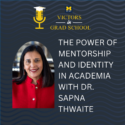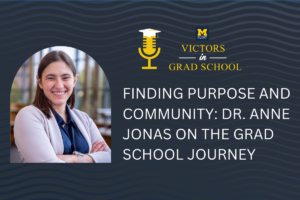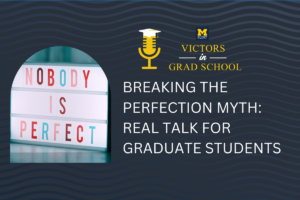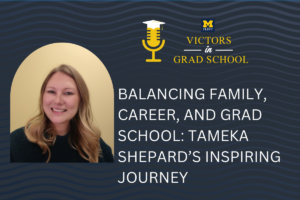
The journey through graduate school is multifaceted, filled with challenges, growth, and incredible learning opportunities. In a recent episode of Victor’s in Grad School, Dr. Christopher Lewis sat down with Dr. Sapna Thwaite, Vice Provost for Academic Affairs at the University of Michigan Flint, to discuss her journey and offer invaluable advice for students. Here’s a deep dive into the insights they shared.
The Birth of a Calling: Choosing Graduate School
Dr. Thwaite’s passion for psychology and education was sparked during her undergraduate studies at the University of Michigan. Initially drawn to English for her love of reading and writing, it was a developmental psychology class under Dr. Scott Harris that truly inspired her. This powerful mentorship and hands-on research experience solidified her resolve to pursue a PhD in educational psychology at Michigan State University.
Choosing the right graduate program involves self-reflection and research. Dr. Thwaite emphasized the importance of aligning your research interests with the strengths of the institution. Staying close to home was another factor for her, but it was the fit with Michigan State’s academic environment that ultimately guided her decision.
Transitioning and Finding Success in Graduate School
Every academic transition comes with its challenges. For Dr. Thwaite, moving from a structured undergraduate environment to the flexible yet demanding world of graduate studies required adjustments. She noted the importance of time management and finding supportive mentors. “Lean into uncertainty,” she advised, recognizing that new experiences and diverse interactions are key to growth.
Dr. Thwaite highlighted that mentorship is not restricted to one individual. Instead, she encouraged students to seek mentorship from multiple sources, including faculty and peers. Embracing a multi-mentor model allowed her to integrate diverse perspectives and cultivate a robust professional identity.
Applying Educational Psychology to Real-World Roles
Dr. Thwaite’s expertise in educational psychology not only shaped her academic path but also her approach as Vice Provost. She noted the centrality of lifelong learning and development in any professional field. Creating opportunities for faculty and staff professional development is a priority for her, ensuring that everyone at the university continues to grow and excel.
In her current role, she applies theoretical knowledge to practice by fostering an inclusive, dynamic environment. Recognizing diverse identities and backgrounds as critical components of a cohesive academic community, she aims to bring out the best in everyone by emphasizing self-awareness and mutual respect.
Tips for Graduate School Success
Success in graduate school requires stepping outside of your comfort zone and engaging with the community. Dr. Thwaite’s advice is particularly relevant for those entering graduate programs:
- Embrace Uncertainty: Lean into the unknown and take initiative to explore new areas.
- Seek Multiple Mentors: Connect with faculty, peers, and professionals who offer different perspectives.
- Be Patient and Reflective: Give yourself time to adjust and self-reflect on your progress and decisions.
- Engage Actively: Join groups, clubs, and attend office hours to build a supportive network.
Navigating graduate school is a transformative journey. As Dr. Thwaite articulates through her experiences, every step, whether smooth or challenging, contributes to the development of a well-rounded, successful academic and professional life. For those contemplating further education, or already on this path, her insights serve as a valuable guide.
For more insights on how to successfully navigate graduate school, stay tuned to Victor’s in Grad School and explore the range of programs offered at the University of Michigan Flint.
TRANSCRIPT
Dr. Christopher Lewis [00:00:01]:
Welcome to the Victor’s in Grad School, where we have conversations with students, alumni, and experts about what it takes to find success in graduate school.
Dr. Christopher Lewis [00:00:11]:
Welcome back to Victor’s in Grad School. I’m your host, doctor Christopher Lewis, director of graduate programs at the University of Michigan Flint. Really excited to have you back again this week. This week, as always, we are on a journey together, and I love being able to walk with you on this path that you’re on. I call it a journey because it truly is a journey. You might be at the very beginning just starting to think about graduate school, just starting to look at schools or programs, thinking to yourself, what do I have to do to get to that next step? Or maybe you’ve already applied or gotten accepted. You could even be in a program right now. No matter where you are, you are on a journey working on your education, working on your future career trajectory and goals, the vision that you have for yourself, And this show is here to be able to help you along that journey.
Dr. Christopher Lewis [00:01:01]:
Every week, I love being able to bring you different guests, different people that have done different things in their own career, but also have gone through graduate school and have been successful. And that’s what this show is all about. This show is all about giving you some tips, some hints, some insights, some things that you could put into your own toolbox that’ll help you to find success in that graduate school journey. Today, we got another great guest with us today. Doctor Sumna Thwaite is with us today, and doctor Thwaite is the vice provost for academic affairs at the University of Michigan Flint. She’s also been a long time faculty member at the University of Michigan Flint in the College of Education. And really excited to be able to have her here today to talk about her own experience and to introduce her to you. Sapna, thanks so much for being here today.
Dr. Sapna Thwaite [00:01:50]:
Thank you so much, Chris. I really appreciate this opportunity.
Dr. Christopher Lewis [00:01:53]:
Well, I love being able to talk to you about this journey that you went on as a student that led you to where you are today. So I’d love to turn the clock back in time. And I know that you did your undergraduate work at the University of Michigan. And at some point during that journey, you had an inkling that you were gonna go on. So there was a little bit of time between your undergraduate degree and when you went to get your PhD. So either during your undergraduate days or early in your career, you chose you identified that there was something, something that was drawing you back in to get that additional degree. Talk to me about that. Bring me back to that point where you just started thinking about graduate school.
Dr. Christopher Lewis [00:02:43]:
What made you decide that going back to graduate school was what you wanted to do?
Dr. Sapna Thwaite [00:02:47]:
So when I was an undergraduate student, I decided very early on that I wanted to major in psychology, and I wanted to major in English. My reasons for
Dr. Sapna Thwaite [00:02:51]:
wanting to psychology. And I wanted to major in English. My reasons for wanting to major in English were not practical in any way. It was because I love to read, and I also wanted to cultivate my writing skills. My interest in psychology was because I felt like psychology was perhaps a calling for me. I really enjoy my interactions with people, understanding human behavior, and understanding the way that people think. I also have always loved being around children, and I’ve loved being around teenagers and kind of learning about what motivates them and how they grow and they develop. And so when I was in my junior year of college, I took a psychology class that was focused on development, human development, and the professor was particularly inspiring, doctor Scott Harris.
Dr. Sapna Thwaite [00:03:40]:
I’m really happy to say that I’m still able to maintain contact with him all these years. But, as I sat in his lecture hall, I was just completely mesmerized with what he had to share, his insights about life. And it made me realize that I wanted to aspire towards a similar role in the future. And so I finally kinda conjured up the courage to go up to him after class to have a conversation with him, which was a really big deal, in a lecture hall of 200 students. And he somehow remembered my face. And later on, I was roaming through the psychology offices looking for a particular professor, not him, And he stopped me in the hallway and asked me if I wanted to explore the possibility of being one of his research assistants and for a whopping $6 an hour. And I was so excited because this is a person who I really idolized, I guess you could say, really looked up to, and I thought I had a lot of information that I could learn from him. So as I started to work with him, I realized I really wanted to go to graduate school.
Dr. Sapna Thwaite [00:04:40]:
So I was in my junior year and he was basically basically a really powerful mentor who helped me then decide and shape my next steps.
Dr. Christopher Lewis [00:04:47]:
So as you were starting to think of those next steps, and you ended up deciding to go to Michigan State University to work on a PhD in educational psychology, every person goes through a different process as they are looking at different programs, looking at different institutions. Talk to me about what you did to be able to not only look at all of the options that were available to you, but also that led you to ultimately decide that Michigan State University’s PhD in educational psychology was the right one for you?
Dr. Sapna Thwaite [00:05:23]:
Okay. So when I was a junior in undergrad, I was leaning more towards pursuing a PhD in developmental psychology, and I was very eager to gain research experience because I knew that I was aspiring towards a research related, degree. And so one of the things that I did that I would really strongly recommend anybody do, while they’re perhaps an undergraduate student, is I volunteered to work on a research project, and that had to do with infant cognition. I was making smiley faces at babies and seeing how they reacted to me. I also participated in the research experience with the professor I just mentioned to you earlier, doctor Paris. That was a paid $6 an hour job, and it involved doing research in a school setting. So I basically tried to expose myself to research as much as I could as an undergraduate student and realized at that point that I was really more interested in learning about learning and development in educational settings. And so that’s what made me deviate from that original idea of becoming a developmental psychologist and go towards ed psych.
Dr. Sapna Thwaite [00:06:25]:
I did work with that particular professor, and this really speaks to the power of mentors, to get some suggestions about possibilities. And I had really wanted to stay closer to home, though I did apply to a wide range of PhD programs. But the one thing that was emphasized to me was making sure that there was a good fit between the graduate school that you are applying to and your own research interests. So I had cultivated my research interests a little bit, as an undergraduate student. No. I had not presented it or, you know, written any papers, but I did have a sense as to where I wanted to go. So actually, I did not even have a gap between my undergrad and my PhD program. The I was advised for the kind of work that I wanted to do that going into kind of more of a straight shot doctoral program would allow one to get the equivalent of a master’s degree along the way.
Dr. Sapna Thwaite [00:07:16]:
And so if you decide after taking your comprehensive exams, I think that’s the point where that you no longer wanna continue on in the doctoral program, you can exit with a master’s. So I had an out potentially, but and and and Michigan State University happened to have a faculty member whose work resonated with me because he was a developmental psychologist in education, which is how I was starting to kind of identify myself.
Dr. Christopher Lewis [00:07:40]:
Every time that you go into a new type of degree, there are transitions. You go from high school to get your bachelor’s, from bachelor’s into a a master’s or PhD program. At every level, the way that you’re being taught is a little bit different, the expectations are different, and what you have to do to find success is going to be a little bit different. Talk to me about those transitions for yourself. As you went from the University of Michigan as a undergraduate student into that master’s, doctorate program at Michigan State University, what did you have to do as you’re going through that transition to find success? But also, what did you have to do to be able to maintain that success throughout the entire time in that program?
Dr. Sapna Thwaite [00:08:29]:
That is a really good question. So I identify as being a creature of habit. I’m very into routines and rituals, and I like being in comfortable settings, surrounded by people who I know. So for me, that transition from undergrad to grad school was a big, big leap. I was also only 22. My brother said to me my older brother said to me, you’re making a mistake. You should take some time off and work. Do something else.
Dr. Sapna Thwaite [00:08:54]:
Get a research position. Do something to gain experience. But I was very focused on going to Michigan State because I had gotten in and I received a really good opportunity to do research there with a professor who I really, really was excited to work with. And so it seemed like the right thing to make that step. But the one thing that I had to do as I made that transition is really lean into uncertainty because this was the first time that I was moving into a territory that I really didn’t know a lot about. You know, going to college, I had a lot of people around me who went to college. But going into a doctoral program in a field that I didn’t have anyone around me who I could turn to, I didn’t have but they’d accept with the exception of that faculty member who was a really powerful mentor for me in undergrad, I didn’t have any friends or any family who had decided to pursue a doctorate in education or psychology. So I was really, like, having to lean into the uncertainty and be patient with myself and really just allow that transition to occur.
Dr. Sapna Thwaite [00:09:57]:
That 1st year was very bumpy for me, partially because I was really encountering a lot of different doctoral students with very different professional backgrounds and very different educational backgrounds than me. Some of them had been teachers. Some of them had been working for foundations. Some of them had been out in the field in other ways. And, you know, I was really one of the youngest ones there and probably one of the least experienced. But I was coming in with a psychology background, and that was really what my focus was, being a psychologist in education. And so I learned over time, the value of being able to embrace your own identity, your own emerging professional identity, but also embracing those of others and realizing there’s a reason why we’re all there together, to learn from each other. And it took me probably a good year before I was able to figure that piece out.
Dr. Sapna Thwaite [00:10:44]:
But it was it was not an easy transition in the beginning.
Dr. Christopher Lewis [00:10:47]:
You know, we always have to be able to do what we can to be able to learn from those pieces and then take those pieces to be able to make those adjustments. What were some of the initial adjustments that you had to make as you were learning that would that helped you as you went further and you got that experience under your belt?
Dr. Sapna Thwaite [00:11:05]:
I think one of the things was my undergraduate experience was a little bit more structured. Graduate school is less structured in some ways. Most of the courses occur from 4 to 7 PM. And then finding ways to manage your time during the day, I was doing research. I was also taking courses. I was also doing my own independent research projects, and I also, dabbled with a few teaching assignments in between. So, learning how to manage my time was a really big piece. And luckily, that was not something too difficult for me because I tend to be very structured in the way that I approach my daily life.
Dr. Sapna Thwaite [00:11:36]:
The other piece was finding those people who I could connect to, and in some ways, not just relying on finding one mentor, which I had in undergrad, but looking to take, in some ways, and this is gonna sound funny, but it it will make sense as I explain it, taking bits and pieces of the people around me and kind of starting to formulate that sense of self that I wanted to have in the future, that professional self that I was aspiring towards. So, for example, later on, as I got into my dissertation, on my dissertation committee, one of the faculty was incredibly creative and an out of the box thinker. I was not as creative. And so I took bits and pieces of what I learned from him and tried to instill a little bit more creativity in the work that I was doing. I had a colleague who had a vast knowledge of literacy practices and what my dissertation topic was gonna draw upon literacy. I took a lot of her knowledge and expertise, and that guided me to learn in different areas that I did not know a lot about. So realizing that that mentor does not just come in the shape of 1 person, but that there are bits and pieces of people around you that you can take that can help you start forming your own identity and your own future professional self. So I really give a lot of credit to those people that I interacted with, those faculty, but I had to seek them out.
Dr. Sapna Thwaite [00:12:48]:
And it didn’t just involve taking classes with them or having them on a committee, but actually having conversations with them and learning about their own trajectories as a part of that.
Dr. Christopher Lewis [00:12:56]:
Now you mentioned that you are currently the vice provost for academic affairs, and that’s after a number of other positions that you’ve had at the University of Michigan Flint. And your professional career has been at the University of Michigan Flint, so you have a long history here at our university. For a number of people, when they think they got a PhD, they’re they’re teaching, and it it makes sense how one thing leads to another. Talk to me about the things that you learned in that educational psychology doctorate program. How has what you learned in that program led you to the work that you’re doing today as vice pros provost for academic affairs? And what do you draw from in regard to that degree on a daily basis that has helped you to be able to be successful in that position?
Dr. Sapna Thwaite [00:13:46]:
That’s a great question. Okay. So as I reflect here for a moment, one of the things that I have recognized now as a vice provost and, you know, I’ve been at U of M Flint now for almost 25 years. One of the things that I’ve recognized is the centrality of learning and development, in our lives as humans and and in our professional lives in whatever we do, whether we are faculty, staff, scholars, administrators, whatever. That learning and development is a is a lifelong process. We are always learning. We are always developing and that we need to create opportunities, like, at least as a vice provost, one of the things that I feel very strongly about is creating opportunities for our faculty and staff to be able to learn and develop. One of my major areas of focus next semester is professional development of all kinds, professional development for faculty and staff related to students and their sense of belonging, professional development related to research, making the transition from being an associate professor to a full professor, learning how to become a leader.
Dr. Sapna Thwaite [00:14:47]:
So all of those things that were really central to my schooling and my experience as an educational psychology doctoral student definitely apply in this day in the work that I’m doing. The other piece probably more so influenced me probably more so as a professor than maybe as a vice provost is the importance of bridging theory with practice. So we learned a lot of really valuable theoretical lenses when we were grad students, but then being able to apply it in a practical setting in a way that students can understand and that they can take with them, like helping our students cultivate the toolboxes they need to be successful in their professional careers is another piece that I learned that I would apply to my life as a faculty and scholar at U of M Flint. And then the third thing that just readily comes to mind is the lens of identity. Now that was something that I started to learn more about as a graduate student. We talked a lot about Sonia Nieto’s work and how a teacher needs to delve into their own identity before they try to understand the identities of their students. So I took those principles with me into my teaching as an educational psychology professor, but even as a vice provost, that having a sense of self awareness, a really acute sense of self awareness when you’re avail when you are aware of what your own strengths and weaknesses are, and being able to bring that knowledge of yourself into your interactions with people you work with. So for instance, you know, understanding identities of the people around you and what they bring to the picture, to me, that’s really, really important, and respecting those identities.
Dr. Sapna Thwaite [00:16:22]:
So, like, one of the things that I’ve realized through grad school into my professional career is a value of engaging with individuals who have very diverse identities and backgrounds, and seeing how those different individuals fit together. But, like, we’re we are all pieces of a jigsaw puzzle that fit together to form this coherent whole. So you need faculty. You need staff. You need staff doing a lot of different things. You need administrators. I would never put any value on one of those roles more than the other because I think we’re all essential pieces that need to be there to work together. Does that make sense?
Dr. Christopher Lewis [00:16:59]:
It does make sense. I I really appreciate you sharing that. Now you just have given a lot of piece of advice in regards to the things that you’ve learned along the way. As you think about students, whether they’re going and getting a master’s or doctor degree in educational psychology, or if they’re a physical therapy student or a medical student, it doesn’t really matter in that regard. As you think about a student going into graduate school, what are some tips that you might offer them that would help them find success sooner?
Dr. Sapna Thwaite [00:17:28]:
Tips for students going into graduate school or students okay. So things to think about while they’re in their grad school experience. Okay. So I have a couple of things that I’m thinking of. The main thing is, perhaps cliche in some ways, but being able to step outside of your comfort zone, I think, is really important. So as I mentioned to you earlier, I’ve always been a creature of habit. I walked into this doctoral program not really knowing what I was getting into. There was a steep learning curve involved.
Dr. Sapna Thwaite [00:17:56]:
I went through a whole 1st year of, in some degree of emotional turmoil, wondering if I had made the right choice. Should I have gone to a psychology doctorate program instead of an educational psychology doctorate program? Did I fit in? But the one way to kind of manage that type of transition is to lean into it, step out of your comfort zone, and also expose yourself to as many different people as you can, not just having professors in classes, but actually taking time to go in and talk to people during office hours, joining groups on campus. Like, if there’s a learning community, focus on a topic that’s interesting to you or a book club or any other kind of extracurricular activity, just really leaning into that. Now I know it’s a lot easier for me to say that I’m more extroverted by nature. I know for some people who are more introverted, it might be a little bit harder to have to be around people. You know, grad school does involve a lot of being around people, and you do need time to kinda shut down at the end of the day because there is a lot going on. But I think being exposed to people, being exposed to different perspectives, and then taking bits and pieces from what you’re learning from different people to start formulating where you wanna go and what you want your future self to look like. That is an active process.
Dr. Sapna Thwaite [00:19:10]:
It is not a process that just happens passively. So you have to kinda lean into it a little bit. That would be my, probably best piece of advice. Also being patient with yourself is really important and acknowledging that transitions are not easy, and that you might take some time questioning why you made the decision that you made or wondering if you made the right decision, but taking a little bit of time to thoughtfully decide and then conclude whether that step was the right step to take. Because if I had made a rash decision, my trajectory might have changed pretty dramatically. But what I’ve realized over time is that transitions haven’t come easy to me, and I always need to give myself at least a year to kinda grow into anything. And that still holds true for me now even as a vice provost. I feel very differently now than I did about a year ago.
Dr. Christopher Lewis [00:19:53]:
And sometimes giving yourself that amount of time is hard when you’re in a short program, and you have to kind of find ways to amplify that or find other mentors or people that can help you to amplify and expedite that process for yourself to be able to jump right in. And as you said, depending on the type of person that you are, sometimes that may not be as easy as it may be for other students. So I really appreciate you sharing that.
Dr. Sapna Thwaite [00:20:22]:
Could I add one quick thing also? As a young doctoral student, the other thing that, I didn’t mention that is really important to mention is that some of those mentors were actually peers of mine. So they weren’t just professors. They were also peers. They were peers in my program who had had a vast variety of life experience. And being able to really learn from them was very important as well. So it’s not just learning from your faculty, but also learning from your peers and and valuing the different professional backgrounds that they bring to their doctoral experience.
Dr. Christopher Lewis [00:20:52]:
Well, I really appreciate you sharing all of this today, sharing your journey, sharing the things that you’ve learned as well as things that may have been a little bit harder than not. So I really appreciate you sharing that today, and I wish you all the best.
Dr. Sapna Thwaite [00:21:06]:
Thank you so much. Thank you for this opportunity. I appreciate it.
Dr. Christopher Lewis [00:21:09]:
The University of Michigan Flint has a full array of masters and doctorate programs if you are interested in continuing your education. Whether you’re looking for in person or online learning options, the University of Michigan Flint has programs that will meet your needs. For more information on any of our graduate programs, visit umflint.edu/graduateprograms to find out more. Thanks again for spending time with me as you prepare to be a victor in grad school. I look forward to speaking with you again soon as we embark together on your graduate school journey. If you have any questions or want to reach out, email me at flintgradoffice@umflint.edu.





